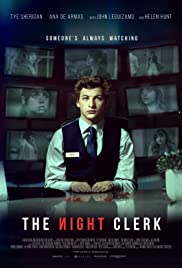
THE NIGHT CLERK
US, 2020, 90 minutes, Colour.
Tye Sheridan, Ana de Armas, Helen Hunt, John Leguizamo, Jonathan Schaech.
Directed by Michael Cristofer.
Tye Sheridan gives an impressive performance as a 23-year-old night clerk in a small suburban hotel. The significant aspect of his performance is that he is portraying a young man with Asperger’s Syndrome. He is Bart, finding a position as a night clerk, very efficient in his job, saying the right things, but very formal in his way of communication.
In fact, the screenplay gives Bart many opportunities to explain to guests, and then to the detective investigating the murder which takes place in a hotel room, how someone with Asperger’s functions, explaining that answers can be quite complicated, taking a long time – and, at various times, this is what happens as he goes through rational explanations, analyses, giving historical information.. While some of the characters let this pass, the explanations are helpful to the film audience.
Bart is something of an obsessive, with surveillance cameras in each of the rooms of the hotel, his watching what goes on, ostensibly to train himself in how to respond better to people, but preoccupied with the behaviour of the guests, especially when he goes home to his elaborate multi-screen studio. Bart is cared for by his mother, played by Helen Hunt, who is protective of him.
Bart watches one of the guests and a violent struggle with a visitor, leading to her death. Bart has it all on his USB sticks. But, does not give them to the police. Because of his behaviour, watching the scene from home and then hurrying to save the woman by returning to the hotel, he comes under suspicion, especially with the interrogations by the detective, played by John Leguizamo.
Bart is transferred to another hotel, encounters a young guest, played by Ana de Armas, friendly towards him, discussing his emotions and loneliness, his becoming concerned for her, protective, even having a haircut, buying new clothes, a bouquet to impress her. But, he sees her lover, whom she had explained to Bart.
Eventually, but Bart does hand over the tapes – but, the aspect of the murder and the investigation seems to take second place to the portrayal of Bart and his character and behaviour.
Best to have low expectations about the crime, better to have higher expectations for a film portrait of a young man and his living with, way of dealing with his Asperger’s Syndrome.
1. Title? The focus on Bart? His work? His personality? Aspergers?
2. The settings, the hotel interiors, front desk, rooms, on surveillance monitors? Homes? The streets? The musical score?
3. The film is a psychological drama, the personality of Bart, aged 23, Apergers, his explanations and elaboration of the condition, exemplifying it, intellectual responses, descriptions, and analysis? The lack of emotional response? The need to study other people for behaviour? Obsessive? The cameras, the screens, his watching on his computer, his system at home, recording people and situations? Continued watching? His relationship with his mother, affectionate, his way of showing it, her love and meals? Eating alone, the final coming up to eat with his mother? His efficiency at his job? The way people treated him, understood him, or not?
4. The guest at the hotel, going into the room, but studying her? Opening the door, the visitor, the violence, brutality, but watching it at home, his return, the gunshot, preoccupation with the blood, the USB sticks, his fellow worker, 911, the police?
5. Bart, his story, the lies, searching for his wallet, placement, the question about how he played paid for the ice cream? (And his comment about the bright shirt?) The meeting with the detective, the questions, his mother trying to protect him, his stories?
6. The boss, talking to the police, but on the transfer, meeting Andrea, talking, filming, responding to the film? Her encounter with him and a shopping? His explanation of his condition, her response, the story of her brother and dying in the institution? The cigarette, the match, the swimming, bringing the towel, wanting to be a lifeguard, the conversation?
7. Andrea, Bart and the beginnings of affection, kiss, her response? Bart’s response, the haircut, the new clothes – and the blunt talking to the obese salesman, not wearing what old people wear, the perfume and the photo? The flowers, his seeing Andrea with the man? His withdrawal? Broken heart?
8. Andrea coming, talking with him, the night, the affection, the effect? The discussions with the lover, the background, the discussion about the tapes? Driving away?
9. Bart, brooding, the gun, fears about him? The police getting the tapes? The truth, pursuing the car with Andrea and the lover?
10. The consequences for Bart, his future?